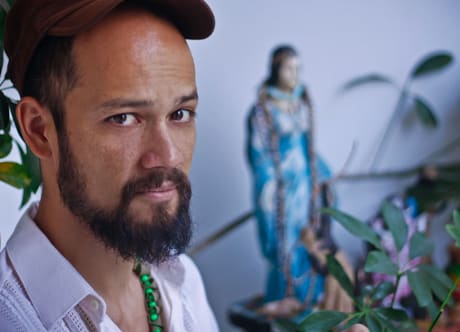The critical success of Santigold's Master of My Make Believe was perhaps the first sign of a détente towards world fusion this year. As much as dubstep, moombathon and other aggressive mid-tempo forms continue to lead the way in cross-cultural musical exchange, there remains a flipside of easier-going gumbo music. Curumin impressed with JapanPopShow in 2008, an eclectic if uneven manifestation of his Spanish-Japanese Brazilian state of mind. Arrocha does everything better. Like Santigold, this pressure sound has a reggae pulse animating it. "Vestido De Prata" (with label mate Céu) captures the sound of dancehall, circa 1982, except with sunnier chord changes giving greater purpose to the ricocheting dub shots. "Doce" follows with an oscillating keyboard sound akin to much West African funk of a certain vintage, only to dive even deeper into the dub end. There's an economy to all the ideas and rhythms, keeping these experiments focused for non-stoners. The pop of "Passirinho" wouldn't sound out of place on the Slakadeliqs' debut album from earlier this year, demonstrating Curumin's hip-hop-derived mixing approaches. Old-timey rhythm boxes, à la Sly Stone, and sour-toned electronics create occasional dark synth ambience for tracks like "Accorda." Arrocha is cosmopolitan album with substance.
It's been a long time coming since your last album, JapanPopShow (2008). What took so long?
That happened because my rhythm's a bit slow, maybe a bit lazy. We did a lot of shows during that time. To really come up with something new, I had to give myself a good amount of time without many responsibilities. Just do that thing and do it for real.
Good, old-fashioned reggae and dub are even more pronounced on this effort. Why the emphasis?
I think the reggae stuff came out because I wanted to do music that works well in concerts. I started thinking about the bass and drums together and this is a very reggae way to work. I always think in melodies, but melodies in rhythms. I think that's why it sounds so reggae vibration.
There's an amazing blend of old and new textures. What kind of gear were you using to create the sounds?
We used a lot of samples and a lot of drum machines. But for this album, I got a gift from a friend of mine: a tape machine. We used that a lot on this album also. We always try to get the sounds a bit dirty; I think one of the focuses of the album was the texture.
It seems like there's a very international sound to the album, Does that describe what's going on in Sao Paolo or is it made for an international audience?
I don't know. Sao Paolo, as in other big cities in the world, has a lot of influences from all over; we have always been watching and looking for something new and different, not just from Brazil, but all over. Thinking about Sao Paolo, you can get music for all tastes ― universal ones, roots ones, folk ones. It wasn't my intention to do an international or universal one, it's just the things I like to hear and the things I like to do.
One thing that happens with going to a new label is that there are sometimes many guest stars. But your new record doesn't have that, with the exception of Ceu. How did Ceu get involved as a guest?
In this album, we're looking for a real simple sound, not a lot of overdubs coming in, just extremely necessary ones ― the minimum. In some songs, the melodies and harmonies are missing, so we called some friends who could really add something different on what the music was missing. Ceu was one of those options because she's a great singer and she made great backing vocals in her songs.
And you're label mates now. What's it like being on Six Degrees?
We're at the beginning now, but so far it's been great, but it's hard to say. In two years, I can tell you better.
You've played a few shows on tour. What's the reaction been like?
Great. We passed through big cities. We're coming back to some big cities like Chicago and New York and people that had been at the shows the last time have said, "wow, we've been waiting for you since 2008. It's great to have you here." For me, it's great. I'm building something; I'm getting some crowds.
Read a review of Arrocha here.
It's been a long time coming since your last album, JapanPopShow (2008). What took so long?
That happened because my rhythm's a bit slow, maybe a bit lazy. We did a lot of shows during that time. To really come up with something new, I had to give myself a good amount of time without many responsibilities. Just do that thing and do it for real.
Good, old-fashioned reggae and dub are even more pronounced on this effort. Why the emphasis?
I think the reggae stuff came out because I wanted to do music that works well in concerts. I started thinking about the bass and drums together and this is a very reggae way to work. I always think in melodies, but melodies in rhythms. I think that's why it sounds so reggae vibration.
There's an amazing blend of old and new textures. What kind of gear were you using to create the sounds?
We used a lot of samples and a lot of drum machines. But for this album, I got a gift from a friend of mine: a tape machine. We used that a lot on this album also. We always try to get the sounds a bit dirty; I think one of the focuses of the album was the texture.
It seems like there's a very international sound to the album, Does that describe what's going on in Sao Paolo or is it made for an international audience?
I don't know. Sao Paolo, as in other big cities in the world, has a lot of influences from all over; we have always been watching and looking for something new and different, not just from Brazil, but all over. Thinking about Sao Paolo, you can get music for all tastes ― universal ones, roots ones, folk ones. It wasn't my intention to do an international or universal one, it's just the things I like to hear and the things I like to do.
One thing that happens with going to a new label is that there are sometimes many guest stars. But your new record doesn't have that, with the exception of Ceu. How did Ceu get involved as a guest?
In this album, we're looking for a real simple sound, not a lot of overdubs coming in, just extremely necessary ones ― the minimum. In some songs, the melodies and harmonies are missing, so we called some friends who could really add something different on what the music was missing. Ceu was one of those options because she's a great singer and she made great backing vocals in her songs.
And you're label mates now. What's it like being on Six Degrees?
We're at the beginning now, but so far it's been great, but it's hard to say. In two years, I can tell you better.
You've played a few shows on tour. What's the reaction been like?
Great. We passed through big cities. We're coming back to some big cities like Chicago and New York and people that had been at the shows the last time have said, "wow, we've been waiting for you since 2008. It's great to have you here." For me, it's great. I'm building something; I'm getting some crowds.
Read a review of Arrocha here.




